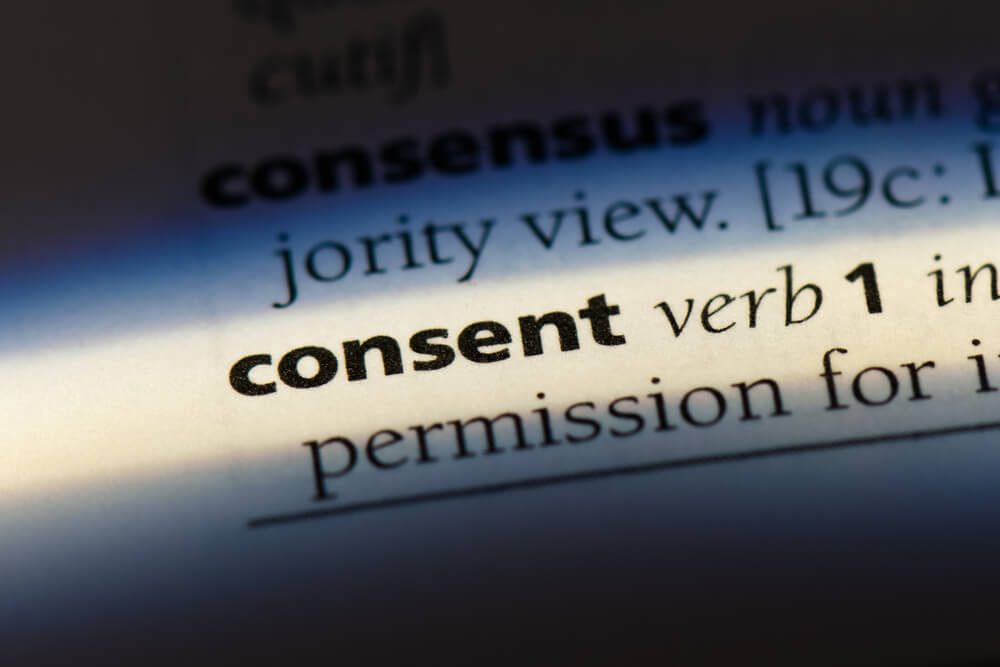The most important part of engaging in sexual activity? Consent. Despite consent being so important, it’s one of the most widely misunderstood, even controversial, aspects of sexuality. STD Testing Facilities wants to change that; that’s why we’re breaking down the basics and giving examples of consent, so everyone can be a more respectful sexual partner.
What is Consent?

Let’s start with the basics: what is consent exactly? In the simplest of terms, consent is when somebody agrees to sexual activity with another person.
However, there’s plenty of reasons why this loose definition can lead to confusion. For starters, laws regarding what counts as legal consent vary vastly depending on location. To make matters worse, sexual education courses don’t always place an emphasis on what counts (or doesn’t) as consent, meaning that basic education doesn’t emphasize consent as an important aspect of sexual activity. Throw in the fact that pop culture tends to get it all wrong (looking at you, “Blurred Lines” by Robin Thicke), and many people won’t quite understand this crucial aspect of human sexuality.
So, what does true consent look like? Consent:
- Is enthusiastic, freely given, and continuous.
- Cannot be coerced.
- Cannot be gained through deceit.
- Can only be given when sober and conscious.
- Can be revoked at any time.
Let’s go into further detail with each of these points.
Consent is Enthusiastic, Freely Given, and Continuous

Rule Number 1, upon which all other aspects of consent are based. What does freely given, enthusiastic, and continual consent mean? It means everyone involved in a sexual activity should be a willing participant. They make a conscious decision to engage in the act, and aren’t coerced into it by other people.
Furthermore, each and every new sex act must be consented to, and the consent must be present the entire time the sex act occurs. This aspect means that consent can be withdrawn at any time, and that giving consent at one time does not mean that it will be given in the future.
Consent Cannot Be Coerced
This aspect means no abusing someone’s trust or using a position of power and authority to pressure someone into sex.
So, for example, a prisoner who agrees to have sex with a prison guard isn’t true consent. Why? Because the guard is in a position of power over the prisoner. If the guard threatened disciplinary actions, this behavior obviously counts as coercion. Since the prisoner would not have consented to sex outside of this scenario, the consent isn’t enthusiastic or freely given.
It’s important to note that the direct threat of disciplinary actions doesn’t have to be present for coercion to occur. After all, because the guard has much more authority in this dynamic, the prisoner may not truly feel comfortable saying no to sexual advances. And, if someone isn’t comfortable saying no, they aren’t really comfortable saying yes, meaning there’s no enthusiastic consent given.
Consent Cannot Be Gained Through Deceit
Having an open discussion about sex is the best route to go. Be honest with your partner about who you are and your sexual history. In other words, disclose any communicable diseases you may have and don’t try to be someone else. Why? Because you want to give your partner all the necessary information they need so that they can give informed consent.
For instance, if you have contracted HIV/AIDS, you must tell your partner before anything happens. After all, this information might affect whether or not they agree to sex. It is their right to accept or decline any offer of sex based on this information.
Another example of deceitful sex is pretending to be someone else to gain consent. Say, for example, a twin pretends to be her sister to trick her brother-in-law to have sex with her. This situation is not informed consent; the brother-in-law believed he was having sex with his spouse, not his sister-in-law. In other situations, the brother-in-law would have rejected his sister-in-law’s advances, meaning informed consent was not present in this scenario.
Unfortunately, one particular form of deceptive sex is on the rise: stealthing.
What is Stealthing?
Stealthing is starting a sex act with a condom. After a time, one partner removes the condom without the knowledge of the other partner. Stealthing is not consensual sex. Why? Because the other partner only agreed to sex with a condom. Removing the condom without asking is not providing a partner with enough information to give informed consent.
Consent Can Only Be Given When Sober and Conscious
A person who is drunk cannot consent. Likewise, a person who is unconscious cannot consent. This fact stands even if a person consented to sex while they were awake and then became unconscious. Why? Because unconscious people cannot give continuous consent.
Consent Can Be Revoked at Any Time
Can consent be withdrawn? Yes! Consent has to be freely given the entire time. That means someone can change their mind right before or even during a sex act. If someone asks for a sexual activity to end, respect that request and immediately stop.
“Sex is like tea” Consent Analogy

Those who want a better visualization for the concept of consent might enjoy this tea metaphor from Rockstar Dinosaur Pirate Princess. The premise of this analogy is that sex is like tea.
Say someone comes over to your house. You then ask them if they want tea.
- If the person immediately says they would love tea, they are giving enthusiastic consent to drink your tea. Make them some tea and give it to them to enjoy, knowing they really wanted the beverage. It can end up being a great experience for both parties.
- If someone says they aren’t quite sure, you can either not make tea or go ahead and make tea. Just know that if you make tea, your guest may not drink it when you bring it out to them. If this situation happens, accept that the guest does not want tea. Do not throw a fit that they do not want tea, no matter how much effort you put into making it. No one is required to drink tea at any time.
- If someone says they want tea, then decides they don’t want it after you make it, respect that wish. Just because you put forth effort into making the tea doesn’t mean someone has to drink it. People can change their minds for any number of reasons, all of which are valid.
- If someone drank your tea last week, don’t be upset if they do not want tea this week. Someone wanting tea on one day doesn’t mean they will want tea every day.
- If someone accepts your tea, they don’t have to drink all of it. Someone can stop drinking it at any time, and you can’t force your guest to drink the entire cup of tea if they don’t want it.
- If someone says yes to tea, then falls asleep, don’t force the sleeping person to drink the tea. Unconscious people cannot continually consent to drinking your tea.
- If someone does not want tea, do not make them tea.
It’s that simple!
You can also check out this concept as a video, provided by Blue Seat Studios.
Sexting and Consent

Consent doesn’t just cover in-person acts; it also covers sexting.
When someone sends you a sexually explicit picture, assume that the sender is consenting only for you to see it. In other words, do not share private images, or nudes, that someone sent you. The only time you may share these messages is when the sender gives express permission beforehand that you may do so. Do not assume that someone agreeing to their nudes being shared with one specific person is an agreement to sharing said nudes with other people.
What does this all mean? It all means no leaking someone’s nudes, no revenge porn, no threatening to share someone’s nudes as a form of blackmail, or similar situations. This concept stands even if you don’t like the other person. For example, it doesn’t matter if your ex was a jerk to you during your breakup—don’t leak their nudes!
How to Ask for Consent
So, how do you ask for consent? The best way to go about it is to get verbal, or spoken, consent from a sober partner. It doesn’t have to be phrased like, “Would you like to engage in sexual intercourse with me?” (although that works), either. Something as simple as, “I’d love to [insert sexual activity]. Is that okay?” can work. Just make the intent clear so your partner has enough information to give enthusiastic, informed, and continuous sexual consent.
Disclaimers: This article is not professional advice, nor does it cover every aspect of this subject.

